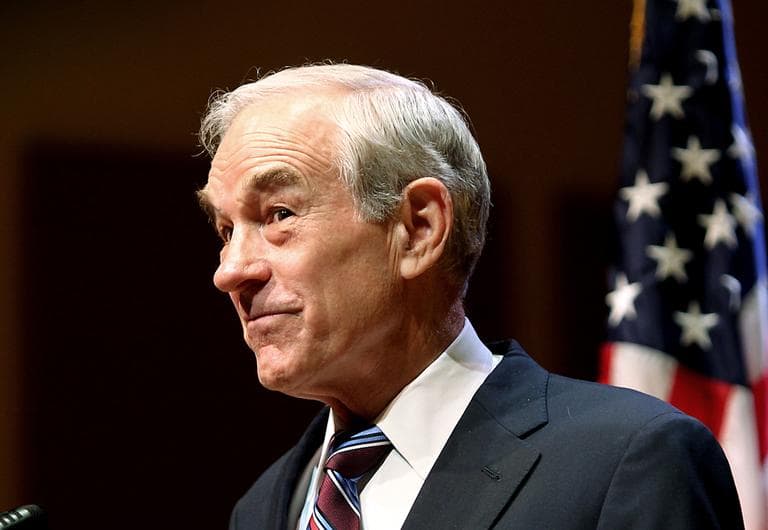Advertisement
An In-Depth Look At Ron Paul
ResumeRon Paul 2012 Contender? Spoiler? Hero? Or Not? We’ll look at this singular GOP

Texas congressman and libertarian-minded Republican Ron Paul has been in politics for a long time now. Twelve terms in the House. More than one swing – typically quixotic – at the presidency.
But never has Ron Paul’s sway been as apparent and his presidential ambitions as on fire as they are right now. The country is worried, and Ron Paul is a refreshingly candid "true believer" with an answer. Slash government to the bone. Bring the troops home from everywhere. Scrap the Fed. Defend personal liberty. And go free market.
This hour, On Point: the banner year of Ron Paul.
-Tom Ashbrook
Guests
Nick Gillespie, editor in chief of Reason.com and Reason TV.
Ned Martel, reporter for the Washington Post. His recent story on Ron Paul is here.
Ben Levine, a student at Drake University and an Iowa precinct captain for Ron Paul 2012.
Max Boot, Jeane J. Kirkpatrick Senior Fellow for National Security Studies at the Council on Foreign Relations.
Highlights
Ron Paul has a fiercely devoted following nationwide and particularly in Iowa, where he’s polling in a tie for second in the GOP primary.
“We have a lot of candidates who are like weak tea,” said Nick Gillespie, the editor in chief of the libertarian website Reason.com “Ron Paul is a double shot of espresso and it presents a true alternative to what most Republicans, much less most Democrats, are saying.”
Paul talks bluntly about what he thinks is right and wrong and his message doesn’t change, Gillespie said.
But what explains Ron Paul’s draw? “This is a time when people want answers to what has gone wrong with the country and he as a person who has been in office for 25 years is a sort of wise figure,” said Ned Martel, a reporter for the Washington Post who wrote about Paul during a trip to Iowa recently. “You can see them stare at his lectures, and that’s what they are really sort of academic lectures, as if he is some type of Yoda figure.”
What would Ron Paul’s America look like, with 80 percent of the federal government cut? “What he’s bettering on is that people don’t really know what the Interior Department does, or what the Commerce Department or the Labor Department do, and that they wouldn’t miss them when they are gone,” Gillespie said.
Gillespie said that Paul’s points are not without merit. The Department of Education, he says, which only came into being in 1980, has not done much to increases in the academic achievement of U.S. students and should be abolished.
It the wake of the financial crisis, Gillespie said, people have been looking in greater detail at institutions like the Federal Reserve, which has long been a target of Paul’s political rhetoric.
“You’ll hear some of his rhetoric wherever you go on the campaign trail,” Martel said, noting that topics like the influence of the Federal Reserve wouldn’t have been a national issue without Ron Paul’s candidacy.
From Tom's Reading List
The Washington Post "Ron Paul is the Rodney Dangerfield of Republican presidential candidates. The 12-term Texas congressman ran for president on the Libertarian Party ticket back in 1988 and was widely seen as a sideshow in 2008, despite finishing third in the GOP field behind John McCain and Mike Huckabee. Why, despite a small but devoted set of supporters, does this 76-year-old obstetrician turned politician routinely get no respect from the media and GOP operatives? Let’s take a look at what “Dr. No” — a nickname grounded in his medical career and his penchant for voting against any bill increasing the size of government — really stands for."
Mother Jones "If at any point during the past three decades you had suggested that Ron Paul might win a major Republican nominating contest, you'd probably get a response resembling the face the Texas congressman makes when he's outlining the case for legalizing the sale of raw milk: two parts incredulity, one part mild amusement, a dash of electric shock."
The American Thinker "Ron Paul, a physician, has earned himself the name "Dr. No" by refusing to vote for any bill which assumes powers other than those given in Article I, Section VIII of the Constitution. When one takes a sober look at our country today, it's easy to see why Dr. Paul would behave this way."
This program aired on December 13, 2011.


